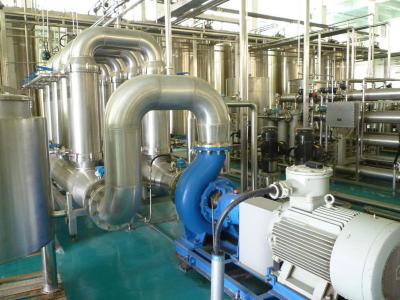Soy sauce originated in China and is an ancient condiment that has been around for more than 1800 years. In the Song Dynasty, the ancient soy sauce was mainly used for the salad dressing. It was used in the cooking of other dishes after the Yuan, Ming and Qing Dynasties.
The value of soy sauce
Soy sauce is rich in nutrients, rich in protein, various amino acids, B vitamins, water-soluble calcium, phosphorus, iron, manganese, zinc, and other minerals, various organic acids, and a variety of physiologically active substances. Soy sauce also has health care functions, mainly in the following aspects:
1. Antioxidant effect: Scientists have found that the antioxidant function of soy sauce is ten times more effective than common antioxidants such as vitamins C and E, and higher than that of red wine. The effect of suppressing free radicals achieved by a little bit of soy sauce is several times higher than that of red wine. In particular, soy sauce can continuously eliminate free radicals, unlike vitamins C and E, which kill a certain amount of free radicals and stop killing.
2. Anti-tumor effect: The antitumor substances in brewing soy sauce are mainly linolenic acid and acetic acid in unsaturated fatty acids. Isoflavones in soy sauce can prevent the effects of genistein on the growth and proliferation of breast cancer, gastric cancer, liver cancer, leukemia and some cancer cells.
3. Lowering blood pressure: There is a blood pressure lowering substance in soy sauce, which can improve cardiovascular function and lower blood cholesterol levels.
4. Anti-aging effect: Soy sauce contains a lot of antioxidants. Anti-aging has a great correlation with anti-oxidation, because human aging is mainly caused by oxidation of the body, and anti-oxidant substances also have anti-aging effects.
5. Sterilization: Pathogenic bacteria such as Staphylococcus, Salmonella, Escherichia coli, and spoilage bacteria are added to the brewed soy sauce. They will all die in 5-7 days.
Production of soy sauce
Soy sauce production process is basically divided into two types, namely low salt solid state and high salt lean state. At present, the fermentation process with high salt and thin state is more popular. Although the method has a long fermentation cycle, a large investment, and a relatively high cost, and it has certain limitations, it is relatively mature in industrial application and can make up for the shortage of existing soy sauce production technology. According to the different production processes, soy sauce can be divided into traditional soy sauce and Japanese-style soy sauce. The main difference between the two is the pretreatment of the raw materials, the strain, the fermentation method, and the extraction method of the soy sauce. The soy sauce of traditional brewing process in China has always been the most prominent problem affecting the quality of soy sauce products in the sensory index color, fragrance, taste, body state (clarity) and the total number of hygienic indicators of soy sauce. Soy sauce production often has incomplete protein decomposition. Fermentation conditions (such as temperature, fermentation cycle, etc.) also directly affect the enzymatic hydrolysis process of the fermentation. These factors directly lead to the retention of tens of thousands of macromolecular substances such as proteins and bacteria in raw soy sauce, making soy sauce difficult to filter.
The traditional separation method uses diatomaceous earth and paperboard filtration. The disadvantage is that the sterilization is not thorough enough, the shelf life is short, and it is difficult to obtain the desired clarification effect, which directly affects the quality of the product. At the same time, the diatomite filter has a large area and high energy consumption, and the discharge and pollution of diatomaceous earth is also a huge problem faced by enterprises. For the traditional removal of microorganisms, steam heating is generally required. Although this method is simple and heterogeneous, the energy consumption is large. When the sterilization temperature is high, the equipment is easy to scale and the flavor of the soy sauce is also affected.
As a new type of chemical separation unit, ceramic membrane separation technology has the advantages of high precision, easy control, good stability and good regenerability. It has shown its superior application performance in the food industry. Since the molecular mass of the main component constituting the soy sauce ranges from 100 to 10000 u, the ceramic microfiltration technology department ensures sterilization and clarification effects, thereby improving the microbial quality and sensory of the soy sauce without impairing the nutrient composition of its original flavor. quality. Japan's soy sauce production process is relatively mature, especially the application of membrane technology is to replace the traditional high temperature sterilization; the clarification of soy sauce replaces the traditional separation method. At present, the production of membrane technology in soy sauce has been launched in China, and domestic brands such as Haitian, Lijingji and Gaga have applications. However, domestic soy sauce is still in a low consumption stage, and the fermentation method is not thorough. The application of membrane technology still has problems such as heavy membrane pollution, high operating cost and short service life. For the above problems, Jiuwu Hi-tech has been able to alleviate the membrane flux attenuation and pollution rate through process optimization. The membrane has good regenerability and greatly reduces the operating cost of the membrane.
With the continuous advancement of science and technology, the soy sauce brewing process will be gradually improved, and the new technology with low investment operation cost, simple operation and stable effect will bring new hope to the soy sauce brewing industry.




 +86-25-58849045
+86-25-58849045
 +86-25-58749295
+86-25-58749295
 jiuwu@jiuwu.com
jiuwu@jiuwu.com
 No. 9 Park Road, Pukou District, Nanjing City (Sanqiao Factory)
No. 9 Park Road, Pukou District, Nanjing City (Sanqiao Factory) Call us on:
Call us on:  Email Us:
Email Us:  No. 9 Park Road, Pukou District, Nanjing City (Sanqiao Factory)
No. 9 Park Road, Pukou District, Nanjing City (Sanqiao Factory)

 English
English 한국어
한국어 français
français русский
русский Español
Español

